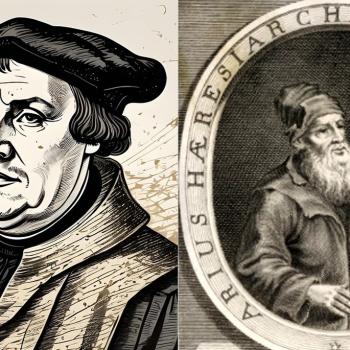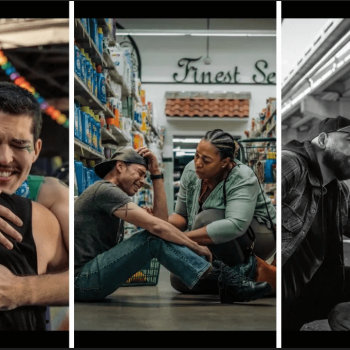The four stages I sketch out in Naked Spirituality are easy to remember: simplicity, complexity, perplexity, and harmony. And really, the progression is pretty easy to grasp too. In simplicity, I want to gain the simple truths about God, the simple truths provided by authority figures in whom I have almost uncritical trust. In complexity, I'm ready to face the complex issues that I wasn't ready for in the first stage, and I'm ready to learn the complexities of thinking things through and working things out for myself. It's easy to see why many people would spend their whole lives in stages one and two.
But let's say I'm born to some really good and mature parents, as I was, who in a sense jump-start me so that stages one and two come naturally for me. Then, I'm prepared to enter a third stage where I go back and challenge the easy answers we all acquire in stage one. I'm also going to have to question the basic dualism of that stage, where "our" authority figures are good and right, and "theirs" are bad and wrong. Now I must face a perplexing reality where the line between good and evil and right and wrong doesn't run between groups or even between individuals, but through every group and within us all.
Many people get to stage three and stay there for their whole lives, but I think the Spirit of God keeps calling us higher up and further in, and so some of us enter a fourth stage where we come to terms with the first three stages, and we seek to synthesize their strengths and grapple with their weaknesses.
Each stage, I think, gives a different motivation for learning in general, and for spiritual learning in particular. In stage one, I'm confident I can master all the simple theological truths. In stage two, I'm challenged to cope with all the theological and spiritual complexity. In stage three, I feel a breakdown of all of the systems I've constructed, and I have to face how little I know in spite of how much I know. So I'm motivated to unlearn and deconstruct. In stage four, I'm looking for deeper unities and the deeper simplicities we talked about earlier.
That brings another question to mind about your book, Greg. As the title suggests, in The Other Jesus you're challenging people to consider an alternative understanding of Jesus. That's going pretty much to the heart of things for some people, and I imagine you've either already gotten or will soon get some pushback. What key issues of pushback do you expect, and what would your response be to those key issues?
Greg: I love that Lenten image of something new and beautiful rising up out of brokenness. That's my prayer for the Church. A lot of recent studies are suggesting that American Christianity, at least as we've done it for some decades, is broken, driving away as many people as it rescues, and that certainly reflects my experience with my formative faith tradition. But I found a faithful alternative and wanted to write about it. That alternative understanding implied in "The Other Jesus" might be "What about this?" as opposed to "You must do this!" My teaching method is generally to ask people questions that prompt reflection rather than to pretend I'm dispensing the truth, but all the same, I'm noticing a couple of prominent and often strongly-voiced objections. Nothing like you or Rob Bell experience, I know, but still more conflict and vitriol than this shy writer has ever encountered.
The first objection is the one about orthodoxy. "You're not a Christian." Really? My life has been saved and transformed by an encounter with the risen Christ, but since I don't think that this belief about the Rapture or that one about homosexuality is essential to salvation, I'm off the charts? I've talked with you about your experiences with pushback over the years, and have observed the recent brouhaha over Rob's questions about heaven and hell, but I guess you're always hoping detractors will read you with some degree of generosity. Or read you at all. Many online commenters seem to be continuing an ongoing argument rather than responding to anything you've actually written.
The other piece of pushback I've taken more seriously: "You've just made up an alternative Jesus in your own image." That mirror-Jesus can be a problem for all of us, and I know that I once shaped my understanding of God around my political beliefs instead of vice versa. In The Other Jesus, inmy weekly column at Patheos, and in the other work I've been doing on religion and culture, I've tried to do the theological homework honestly—kind of like your authentic engagement with the Psalms and Job, among other texts, in Naked Spirituality—and to let the discoveries that emerge shape who I am and what I believe. The new book grew out of my own stage-three search prompted by brokenness, and, I hope, represents a stage-four attempt to discern and suggest some deeper unities and deeper simplicities. In any case, I can say this: the Jesus I write about now seems an authentic reflection of the Jesus we find in the Gospels, the tradition, and my own experience.




